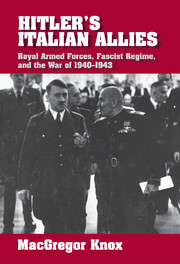Book contents
- Frontmatter
- Contents
- Acknowledgements
- List of Abbreviations
- Map
- Introduction: Defeat – and Humiliation
- 1 Fascist Italy's Last War
- 2 Society, Politics, Regime, Industry
- 3 Men and Machines: The Armed Forces and Modern Warfare
- 4 Strategy
- 5 Operations
- 6 Tactics
- Conclusion: The Weight of the Past
- Chronology
- Bibliographical Note
- Index
5 - Operations
Published online by Cambridge University Press: 19 January 2010
- Frontmatter
- Contents
- Acknowledgements
- List of Abbreviations
- Map
- Introduction: Defeat – and Humiliation
- 1 Fascist Italy's Last War
- 2 Society, Politics, Regime, Industry
- 3 Men and Machines: The Armed Forces and Modern Warfare
- 4 Strategy
- 5 Operations
- 6 Tactics
- Conclusion: The Weight of the Past
- Chronology
- Bibliographical Note
- Index
Summary
“Operation is movement” was the principle on which General Hans von Seeckt refounded the post-1919 German armed forces. They in turn imposed that principle on the forces of Germany's main adversaries. The purpose of movement was the surprise concentration in time and/ or space of strength against enemy weakness within a theater of war, in execution of a campaign plan designed to achieve the strategic objectives of the state. The conduct of operations required a doctrine that fostered the combined employment of the three services and the combination of arms – their coordinated use – within the ground forces. Operations, the Germans discerned, also required a particular command structure and style. Unity of command was highly desirable; creative freedom for subordinates within the framework of their superiors' intent was vital; and commanders capable of exploiting that freedom were indispensable. Operational success also required a force structure that combined foresight, coordination, movement, and striking power: intelligence and reconnaissance, supremely effective communications, mechanization to the greatest extent possible, massive firepower, and lavish logistical support to sustain both fire and movement. A further prerequisite was constant training exercises to test and refine the ability of both leaders and large ground, air, and naval units to frame and execute campaign plans.
The Italian armed forces in 1940 recognized virtually none of these principles except in a purely verbal sense. The inability to plan campaigns had been the root cause of the great defeats of 1848–49 and 1866. The Great War had taught little; tactical stalemate had so crippled movement that only the Germans and the British in Palestine and in the West after July 1918 learned much about the conduct of operations.
- Type
- Chapter
- Information
- Hitler's Italian AlliesRoyal Armed Forces, Fascist Regime, and the War of 1940–1943, pp. 111 - 142Publisher: Cambridge University PressPrint publication year: 2000

